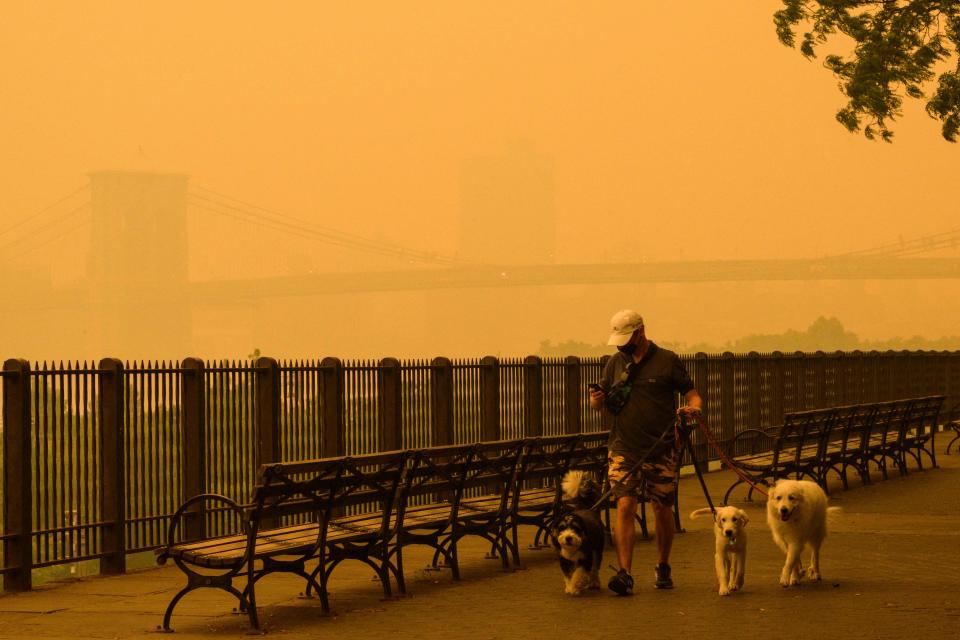Bad air quality from Canada wildfire smoke harms your pets, too. How to protect them.
When wildfire smoke turns skies hazy and threatens health with dangerous air quality, people should stay inside as much as possible, but what about their pets?
Our four-legged friends can't wear masks outdoors to protect them from the smoke, but many of them might still need to go outdoors during this time. It's important to keep monitoring their health and try to keep them inside as much as possible, said Dr. Aly Cohen with the Cornell University Riney Canine Health Center.
"Hopefully this won't be something that lasts forever, but just try and be as mindful as you can and entertain them the best you can indoors," Cohen said.

How smoky air can impact your furry friends
The health impacts on pets and all animals can be similar to those on humans, but some breeds are more likely to be at risk of respiratory problems, Cohen said. Both the elderly and the very young are at higher risk, as are pets with pre-existing heart disease or lung issues, she said.
Some breeds of dog, called short-muzzle breeds, also already have higher rates of respiratory issues, including bulldogs, Boston terriers and Cavalier King Charles spaniels. Pet birds and horses also are at higher risk, Cohen said.
Cohen said pet owners should look out for certain symptoms of effects from the smoky air:
Red and watery eyes
Watery nose
Coughing or gagging
Elevated respiratory rate when not engaged in activity
If pets' breathing rates aren't calming down or they have a newly developed cough that doesn't seem to be getting better, Cohen said it's best to check in with a vet.
Zoos in New York and Washington, D.C., closed and animals were brought inside Thursday amid "hazardous" levels of particulates in the air.
HOW TO PROTECT YOURSELF: Wildfires in Canada are impacting US air quality. Here's what you should do to stay safe.
What you can do to protect your pets
Even in the worst air quality conditions, some pets – mainly, dogs – still need to go outside to do their business. But Cohen said to keep bathroom breaks short during this time.
"It's OK to at least have them go out to relieve themselves," Cohen said. "If you normally do this big, long walk around the block to have them relieve themselves, you might want to limit that time. Certainly, I would avoid exercise right now."
If your dogs are used to getting their energy out with outdoor walks or play, Cohen said you should do as much as you can to keep them entertained indoors. Mentally stimulating treats and games, like puzzles or long-lasting bones, are good tools to use for energetic pets.
"You've got to think of it almost like your kids," Cohen said. "Lots of kids can't go on the playground, so I'm sure all the parents are pulling those indoor activities out."
For animals that live outside, like horses and other livestock, it's a little harder to manage the added risk. Cohen said it's important to reduce stress, such as moving them, and activity as much as possible for horses, and keep them in barns if possible. Give them access to plenty of fresh water. Owners can also wet down hay and feed to reduce extra dust that they could be breathing in.
This article originally appeared on USA TODAY: Bad air quality can harm pets: How to protect them in Canada wildfires

